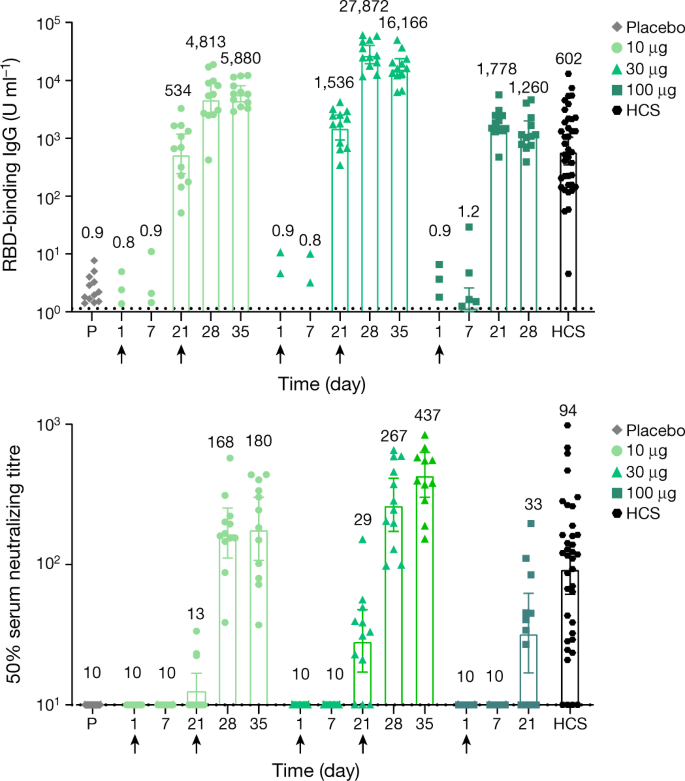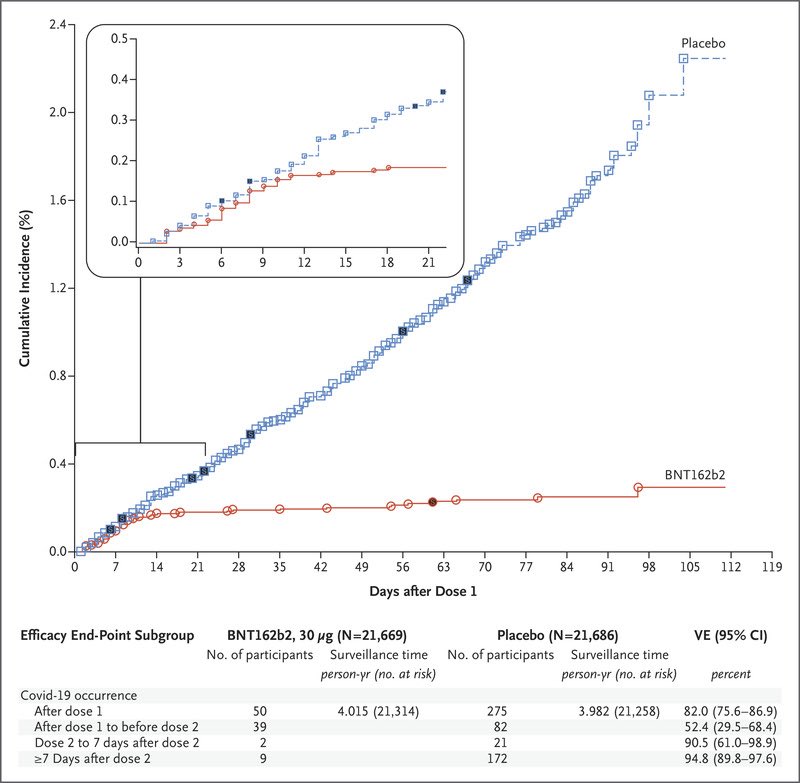
It's depressing that so many journalists (and some academics) are easily distracted by shiny objects (in the form of newly reported Pfizer efficacy "studies"), without (apparently) having read the source data and understanding the implications and limitations. 🙄
Last night @CNN reported (with almost breathless excitement), that a new Pfizer study in the @NEJM showed that a single dose of Pfizer vaccine is 92% effective.
Is that a fact?
Is that a fact?
This "new" study, contains NO new data.
It is a letter, NOT a paper.
It simply repeats the same statistical "trick" the JCVI did, calculating the efficacy of the 1st dose only after ignoring the data from the first 14 days after it was given.
No shit, Sherlock.
It is a letter, NOT a paper.
It simply repeats the same statistical "trick" the JCVI did, calculating the efficacy of the 1st dose only after ignoring the data from the first 14 days after it was given.
No shit, Sherlock.
I was a postgraduate student but never a career academic.
However, I know that "pressure to publish" exists in academia.
This letter seems like a fairly easy way for someone to boost their publication rate and get lots of effusive press coverage. 🙄
However, I know that "pressure to publish" exists in academia.
This letter seems like a fairly easy way for someone to boost their publication rate and get lots of effusive press coverage. 🙄
Carrying out the same calculation the JCVI already did, does NOT offer either independent verification or corroborative evidence, of their approach.
It's a retread.
It's a photocopy.
It offers NO additional proof.
nejm.org/doi/full/10.10…
It's a retread.
It's a photocopy.
It offers NO additional proof.
nejm.org/doi/full/10.10…
There is NO doubt that a single Pfizer dose has an immunological effect.
That is very clear from the Pfizer data.
What we do NOT know, is for how long that level of efficacy is maintained.
We have no idea if it will last for as long as 12 weeks.
mRNA vaccines are new.
That is very clear from the Pfizer data.
What we do NOT know, is for how long that level of efficacy is maintained.
We have no idea if it will last for as long as 12 weeks.
mRNA vaccines are new.
An earlier Pfizer paper (with a different vaccine candidate) shows that the interaction between the 1st and 2nd dose (at Day 21) vastly boosts antibody levels and that the antibody levels of a single (much larger) dose falls (by about 30%) by Day 28.
nejm.org/doi/full/10.10…
nejm.org/doi/full/10.10…

Another Phase 1/2 trials paper (of the actual vaccine candidate being used) shows neutralising antibodies only appear in significant numbers, AFTER the 2nd Pfizer dose has been given at Day 21.
medrxiv.org/content/10.110…
medrxiv.org/content/10.110…

Additionately, there is Pfizer data which suggests that a single dose produces a much lower immune response in the 55-85 age group.
Not ideal when that covers most of the UK's "priority" groups. 😬
Not ideal when that covers most of the UK's "priority" groups. 😬
https://twitter.com/KennyMathieson/status/1356276520055148551?s=20
Last night @SkyNews (among others) gushingly reported a new Israeli study.
news.sky.com/story/covid-19…
news.sky.com/story/covid-19…
'Report author Professor Arnon Afek, deputy director-general of Sheba Medical Centre, said: "This ground-breaking research supports the British government's decision to begin inoculating its citizens with a single dose of the vaccine."'
D'ya think so?
D'ya think so?
This "groundbreaking" study compares infection rates per day, over a limited period, during which the background rate of infection in Israel varied significantly.
It reports NOTHING beyond Day 28.
It's also a VERY long way removed from being a randomised clinical trial.
It reports NOTHING beyond Day 28.
It's also a VERY long way removed from being a randomised clinical trial.
This "groundbreaking" study, looks at data in a 28 day period, when we already know (from the Pfizer paper) that there is NO effect for the first 12 days after the 1st dose.
Gambling the health of an entire nation on the basis of 16 days worth of 'muddy' data?
No thanks. 🤦🏻♂️
Gambling the health of an entire nation on the basis of 16 days worth of 'muddy' data?
No thanks. 🤦🏻♂️
"Israel reported that its SARS-CoV-2 incidence increased by one-third between weeks 52 and 53 in 2020 and again by one third between week 53 in 2020 and week 1 in 2021."
See: significancemagazine.com/science/697-we…
See: significancemagazine.com/science/697-we…
We already know there is a strong immune response by Day 21, that's not in doubt.
At the risk of repetition, the issue is we don't know how effective a single dose will be by Day 84 (12 weeks) OR how strong an effect a 2nd dose will have, when given at that stage.
At the risk of repetition, the issue is we don't know how effective a single dose will be by Day 84 (12 weeks) OR how strong an effect a 2nd dose will have, when given at that stage.
We can only know (with any confidence) that which has been proven by a randomised clinical trial.
I refer you to the words of @DrLeanaWen
I refer you to the words of @DrLeanaWen
https://twitter.com/KennyMathieson/status/1357149353740279810?s=20
I refer you to the wisdom and judgement of Dr. Anthony Fauci.
https://twitter.com/KennyMathieson/status/1354946996105322498?s=20
I refer you to the opinion of @DrPaulOffit who is on the FDA Vaccine Advisory Committee. 

The UK is currently conducting a population-wide experiment with the health of its citizens.
Risks have NOT been highlighted.
Politicians have given reassurances which are entirely unsupported by science.
Accordingly, informed consent has not been possible.
Risks have NOT been highlighted.
Politicians have given reassurances which are entirely unsupported by science.
Accordingly, informed consent has not been possible.
We can only hope that the UK strategy works out.
If it does, it will owe FAR more to good luck than to having followed the science.
Scientific training teaches one to be sceptical of unproven claims.
Ask questions.
Challenge.
If it does, it will owe FAR more to good luck than to having followed the science.
Scientific training teaches one to be sceptical of unproven claims.
Ask questions.
Challenge.
If I hear a single question being asked by a journalist who has clearly (from the nature of their question) read and understood a relevant scientific paper, it will be the first related to the UK Pfizer vaccine strategy.
More challenging questions.
Less uncritical cheerleading.
More challenging questions.
Less uncritical cheerleading.
“We’ve arranged a society on science and technology in which nobody understands anything about science and technology, and this combustible mixture of ignorance and power sooner or later is going to blow up in our faces.” - Carl Sagan (final interview)
• • •
Missing some Tweet in this thread? You can try to
force a refresh



